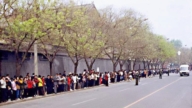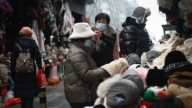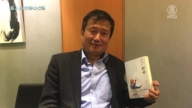【新唐人2011年3月31日讯】G20南京“国际货币改革研讨会”,希望达成国际货币体系改革的具体方案,但中共方面拒绝讨论人民币汇率问题,会议时间也被限定为仅仅一天。外界认为,这么大的一个世界性集团会,又能开成什么样?请看报导。
法国总统以及德,美,英等主要国家财长。3月31号将出席在中国南京召开的G20“国际货币改革研讨会”。法国最初提议,南京研讨会的议题是外汇政策讨论。法国总统萨尔科齐希望,中国能够接受讨论人民币汇率这个高度敏感问题。
不过,《法国国际广播电台网站》29号编译的《费加罗报》文章中指出,法国总统萨尔科齐强调,巴黎所希望的20国集团会议在货币问题上令北京尴尬。
20国集团消息人士表示,中共不愿意把外汇政策作为重要讨论话题,担心南京研讨会过度关注人民币汇率问题。
中共在会议召开前发出明确讯息,与会者应该就货币问题展开讨论,但是话题不应涉及具有时事性的具体问题。
《华尔街日报》表示,中共竭尽全力最大限度矮化南京会议的重要性。会议时间被限定为仅仅一天。外交部发言人姜瑜在记者会上说,这次会议的性质是“非正式和学术性的”。
《华尔街日报》还表示,会议演讲嘉宾包括学术界评论员,也包括20国集团成员国的财政部长和央行行长。会议的排程如此紧凑,每位演讲人只有几分钟时间,来阐述他们对国际货币体系未来前景的看法,讨论的深度似乎注定不会太强。
然而,就在G20南京“国际货币改革研讨会”举办之前,中国掀起了日化行业最大规模的涨价潮,上海等几大城市日化用品都已被抢空。日化企业纷纷调高价格,使消费者“怕涨”的敏感神经再次被刺激,对物价上涨的心理恐惧再次加深。
据《新世纪》周刊宏观新闻部副主任王长勇的分析,各类商品价格上涨表明大陆通胀是全面通胀,并非结构性通胀。
不管怎样,整个欧洲、整个世界都异常关注法国总统将主持在中国的这次会议。《BBC》稍早前报导,法国官员表示,法国将派财政部长拉加德和中央银行行长诺耶参加这个为期一天的会议。作为G20轮值主席国,法国希望能够寻求解决期货价格波动问题以及全球经济失衡。而2月在巴黎举行的G20 峰会上,中共不愿把汇率和货币来作为测定失衡的指标。
会议到底能“议成”哪些决定?法国总统主持的中国G20会议能干成些什么?全世界将拭目以待。
新唐人记者唐睿、朱棣综合报导。
Would Nanjing’s G20 Embarrass Beijing?
G20’s “International Monetary Reform Conference"
in Nanjing aims to draw plans for reforms
in the international monetary system.
However the Chinese communist regime
refuses to discuss the RMB issue.
The meeting time is limited to one day only.
What outcomes could Nanjing’s G20 achieve?
French President and finance ministers of Germany,
U.S., UK and other major countries will attend
on March 31 the G20 Summit in Nanjing,
“International Monetary Reform Conference”.
France proposed to discuss foreign exchange policy
issues. French President Sarkozy hopes that China
will accept to talk about its sensitive RMB issue.
Le Figaro’s article from March 29 points out
however, that Sarkozy has pointed out
that the currency issue at the G20 conference
could be embarrassing for Beijing.
A G20 source said that the Chinese regime
does not want foreign exchange policy to be
given importance at the seminar in Nanjing,
worrying of an excessive attention on the RMB issue.
The communist regime sent a clear message
before the meeting that participants should discuss
the currency issue, but the topic should not
deal with specific issues within the current affairs.
The WSJ said the regime dwarfs every effort, as
to minimize the importance of the Nanjing meeting.
Foreign Ministry spokeswoman Jiang Yu said
at a news conference that the nature
of this meeting is “informal and academic."
The WSJ also said that the meeting speakers include
academic commentators, G20’s ministers and
central banks governors. Meeting schedule is so tight,
each speaker has only a few minutes to air their views
of future international monetary system.
The depth of the discussion seems doomed too.
However, just before the G20 Nanjing conference,
China set off the largest wave of price increases
on daily essentials. In major cities such as Shanghai,
daily essentials run low. Suppliers raise prices, and
psychological fear of raised prices deepens again.
According to New Century magazine,
Wang Changyong, Deputy Director of the
Department of Macro Analysis,
says that prices of all goods are going up,
which is a sign of overall inflation, not structural.
Europe and the rest of world are closely watching
this meeting, chaired by the French President.
BBC had earlier reported that French officials said
they will send their Finance Minister and central bank
governor to participate in this one-day conference.
Presiding G20, France hopes to find a solution
to future price volatility and global economic
imbalances. In February at the G20 summit in Paris,
the communist regime refused changes of rates
and monetary indexes as measures of imbalance.
What outcomes would this summit achieve?
Can the French presidency make a difference?
The world will have to wait and see.
NTD reporters Tang Rui and Zhu Di



























